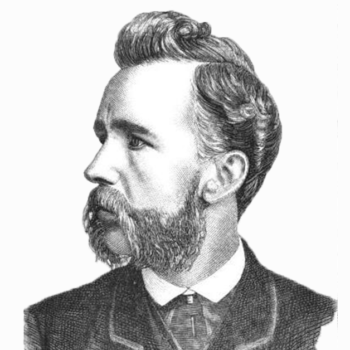
To mark Banned Books Week, at the start of October Humanists UK held its inaugural Wikipedia edit-a-thon (or ‘wikithon’), focusing on expanding the online encyclopedia’s coverage to do with publishing, censorship, and freedom of thought and expression.
It was organised as part of Humanists UK’s ongoing Humanist Heritage Project, which is researching the history of humanism ahead of the charity’s 125th anniversary, and was supported by Wikimedia UK.
The event brought together a mix of historians and writers as well as first-time editors and online activists to make a meaningful contribution to Wikipedia’s coverage of humanist history, drawing on a range of sources unearthed by historians as part of the Humanist Heritage Project.
What’s a wikithon?
A Wikipedia edit-a-thon or wikithon brings people together (in this case, virtually) to work on improving pages on Wikipedia around a certain theme. Freedom of the press has long been central to the concerns of freethinkers the world over, and humanists have been at the forefront of many fights to gain or maintain it. As such, the list of potential pages to work on was lengthy, but the challenge was valiantly met by everyone who took part.
Wikipedia relies entirely on citations from reliable published sources, which provide information for articles, as well as helping to prove that the chosen subject is ‘notable’ enough for inclusion. Although digitisation efforts and online libraries mean that many useful sources are now available digitally for free, mining them for material takes knowledge, time, and a concern for the accurate representation of previously neglected topics.
To address gaps in what is on Wikipedia, and who’s writing it, Wikimedia Foundation and its UK branch Wikimedia UK, encourages historians, universities, charities, and arts and culture organisations to organise ‘wikithons’ that will improve the overall quality and breadth of the encyclopedia. Wikithons also help Wikimedia to engage a wider and more diverse community of editors, who can help to address imbalances in Wikipedia’s coverage. For example, women in history are often under-represented on Wikipedia, as are notable figures from non-English speaking countries.
Banned Books Week
Humanist Heritage’s first wikithon event focused first on introducing participants to the basics of editing Wikipedia, including how to make sure pages are well referenced and visually clear. It then moved on to the practice of editing itself, spending time getting the hang of Wikipedia’s many quirks and intricacies, as well as putting new skills to work in improving the pages of those associated with press freedom. Among these was socialist, feminist, and freethinker Emma Martin (1812-1851), who started her life as a staunch Baptist, put her Biblical knowledge to work as an outspoken atheist, and ended her days as a midwife. The page of her friend and fellow freethinker Matilda Roalfe (1813-1880) received attention too.
Also developed were biographies of humanists Henry Hetherington, Edward Truelove, and Austin Holyoake: printers and publishers who fought for their own, and others’, rights to think and speak freely. Hetherington (1792-1849) worked to abolish the so-called ‘tax on knowledge’, whereby increased stamp duty on newspapers was used in an attempt to prevent radical materials getting into the hands of the working class. Edward Truelove (1809-1899) was sentenced, at the age of 70, to four months in prison for publishing materials advocating birth control. Austin Holyoake (1826-1874) worked diligently alongside his better-known older brother George Jacob Holyoake to advocate secularism through his work at Fleet Street House, the printing premises in which the germ of the Rationalist Press Association was contained. All of these figures, as Truelove’s obituary claimed of him, ‘made it more difficult for authorities, whether engaged in currying favour with a foreign tyrant or backing up an outworn creed, to coarsely answer the pen with the gaol [jail].’
Reflecting on the event, Humanist Heritage Coordinator Madeleine Goodall said:
‘We were delighted with the response to our first ever Wikipedia event, which brought together a group of people with wide-ranging interests and a genuine enthusiasm for humanist history. Among our participants were artists, librarians, students, and heritage professionals from all around the country.
‘I’m very proud of what we achieved in our first session. By making humanist history freely available online – and not hidden away in archives or out-of-print books – we celebrate the names and stories of all those who fought for freedom of expression in the past and the humanists who continue to do so today.’
If you’re interested in becoming part of the Humanists of Wikipedia, you can sign up using the button below to keep informed of future events. A second wikithon on ‘Humanist Women’ is scheduled to take place in November. Details will be announced soon.
Notes
For more information about this story, the Humanist Heritage Project, or getting involved with Humanists of Wikipedia, please contact Madeleine Goodall on madeleine@humanists.uk.
Humanists UK is the national charity working on behalf of non-religious people. Powered by over 85,000 members and supporters, we advance free thinking and promote humanism to create a tolerant society where rational thinking and kindness prevail. We provide ceremonies, pastoral care, education, and support services benefitting over a million people every year and our campaigns advance humanist thinking on ethical issues, human rights, and equal treatment for all.
In 2021, Humanists UK will turn 125 years old. It will be celebrating its anniversary with a renewed focus on its history, including a new Humanist Heritage website that tells the untold story of humanism in the UK – the stories of people, groups, objects, places, movements, publications, and ideas.
Read our article: Countdown to 125th Humanists UK anniversary
Read our interview with Humanist Heritage Coordinator Madeleine Goodall.
Read the Heritage Creative interview with Luke Donnellan, Director of Understanding Humanism.
